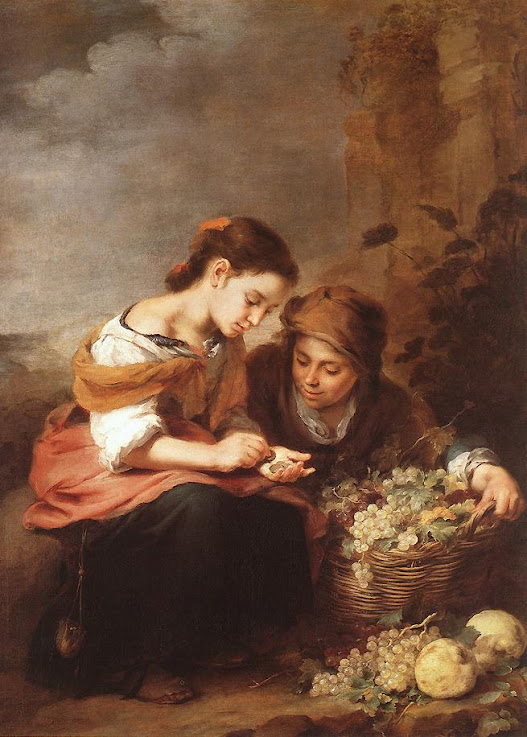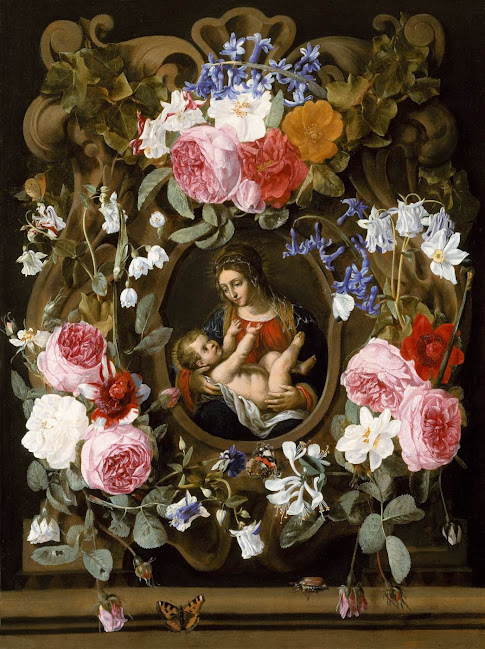Readings (Jerusalem Bible: Australia, England & Wales, Ireland, New Zealand, Pakistan, Scotland)
Readings (New American Bible: Philippines, USA)
Gospel John 15:9-17 (English Standard Version, Anglicised)
Jesus said to his disciples:
“As the Father has loved me, so have I loved you. Abide in my love. If you keep my commandments, you will abide in my love, just as I have kept my Father's commandments and abide in his love. These things I have spoken to you, that my joy may be in you, and that your joy may be full.
“This is my commandment, that you love one another as I have loved you. Greater love has no one than this, that someone lay down his life for his friends. You are my friends if you do what I command you. No longer do I call you servants, for the servant does not know what his master is doing; but I have called you friends, for all that I have heard from my Father I have made known to you. You did not choose me, but I chose you and appointed you that you should go and bear fruit and that your fruit should abide, so that whatever you ask the Father in my name, he may give it to you. These things I command you, so that you will love one another."
The video above is from the Ecumenical Evening Prayer in Westminster Abbey, London, on 17 September 2010 during the visit of Pope Benedict XVI to Britain. He is with Anglican Archbishop Rowan Williams of Canterbury.
This is a setting by Thomas Tallis (c.1505 - 1585) of today's Communion Antiphon with the first part of John 14:17 added.
If ye love me, keep my commandments,
and I will pray the Father,
and he shall give you another comforter,
that he may 'bide with you forever,
e'en the spirit of truth. (John 14:15-17)
Communion Antiphon Antiphona ad communionem (Jn 14:15-16)
Si diligitis me, mandata mea servate, dicit Dominus. Et ego rogabo Patrem, et alium Paraclitum dabit vobis, ut maneat vobiscum in aeternum, alleluia.
If you love me, keep my commandments, says the Lord, and I will ask the Father and he will send you another Paraclete, to abide with you for ever, alleluia.
In May 2015 I gave a retreat to the Missionary Sisters of the Catechism in Lipa City, south of Manila. The Sisters have a house dedicated to Our Lady of Guadalupe where they take care of elderly and sick women whom they refer to as the lolas, the 'grandmas'. In another part of the compound they had at the time a group of orphans, five young boys and six young girls. (If my memory is correct the Sisters were planning to build an orphanage). Four of the boys served Mass every morning, including 'Zacchaeus', as the Sisters called him, the youngest of them and small, proudly wearing his white cassock like the others. 'Zacchaeus' wasn't yet old enough to make his First Holy Communion or First Confession. His role as a server was to hold up the small white towel - and he really had to stretch to do so - when the priest washed his hands during the Offertory.
The youngest of the girls was Chiara, aged four or five at the time. The children were present at lunch on the last day of the retreat, which had a celebratory air to it. I noticed after I had said Grace Before Meals that Chiara was somewhat tearful. Then I discovered that on such occasions she led the community in a Hail Mary as part of Grace. So the Sisters encouraged her to do so even though this visiting priest had pre-empted her. After a little hesitation and the drying of her tears she prayerfully led us all in the Hail Mary and then invoked the protectors of the Congregation - Our Lady of Good Counsel, St Joseph, St Veronica Giuliani, St Gemma Galgani and St Bernadette Soubirous.
During the retreat I told a number of stories of seemingly insignificant events where God had revealed himself to me through the actions of children and of older persons without their being aware of it. Then on the way back to Manila after the retreat Sister Evelyn Cortes SMC, whose family I have known since she was in high school in Tangub City, Misamis Occidental, and Sister Eppie Resano SMC told me a story about Chiara where she showed an understanding of what this Sunday's Second Reading is all about, without being aware of it.
Beloved, let us love one another, for love is from God, and whoever loves has been born of God and knows God. Anyone who does not love does not know God, because God is love. In this the love of God was made manifest among us, that God sent his only Son into the world, so that we might live through him. In this is love, not that we have loved God but that he loved us and sent his Son to be the propitiation for our sins (1 John 4:7-10).
Some time before I gave the retreat a missionary priest visited the Sisters and celebrated Mass for them. Little Chiara saw him as being very severe in his demeanour. After Mass she tugged on his cassock and asked him, Father, are you angry with God? It seems that the following morning he wasn't quite as severe looking!
Some may be angry with God. I don't think that God is too perturbed about that when he knows that the source of our anger may be bewilderment over tragedies in our lives, for example, just as we allow those whom we love to vent their anger on us because basically they trust us and we have some idea of the source of their anger.
Perhaps a more common experience, especially among persons who are serious about following Jesus faithfully but who try to live as if God's love had to be earned, as if it could be earned, is the idea that God is angry with us or very distant from us.
St John tells us so beautifully what the situation really is: In this is love, not that we have loved God but that he loved us and sent his Son to be the propitiation for our sins.
Most of the Gospel readings on the Sundays and weekdays of Easter are taken from John 13-17, the Last Supper Discourse in which Jesus speaks to each of us with intense love about the intimacy into which he calls us personally through our baptism. In today's Gospel Jesus says to each of us, speaking from his heart to ours - Cor ad cor loquiter, 'Heart speaks to heart', as St John Henry Cardinal Newman emphasised on his coat-of-arms - As the Father has loved me, so have I loved you. Abide in my love . . . This is my commandment, that you love one another as I have loved you . . . You are my friends . . . You did not choose me, but I chose you . . . The initiative comes from God. Love comes from God and our loving response to that love is itself a gift from God. We do not and cannot earn God's love. God who is love gives us himself as pure gift.
How can such a God be angry with us and how can we be angry - choosing to remain angry as distinct from a spontaneous feeling - with such a God?
In this is love, not that we have loved God but that he loved us and sent his Son to be the propitiation for our sins (1 John 4:10).
For the LORD takes delight in his people;
he crowns the poor with salvation (Psalm 149:4, Grail translation).
Although this was recorded during Advent, Alleluia - Praise God is preeminently an Easter song. The Hebrew word Alleluia is the same in whatever languages Christians sing or pray. In the Northern Hemisphere Easter always falls in springtime which produces many yellow flowers, of which the blouse worn by singer Khánh Ngọc reminded me. And an ancient Hebrew word, set to music by an 18th-century Austrian who died at the age of 35, is sung to praise God in the cathedral in Hanoi by a young Vietnamese in a country where the Church has undergone persecution and where the people suffered from war for many decades. We truly are called to be disciples of Jesus crucified and now risen from the dead, with the hope of eternal life that that brings. Alleluia!
Traditional Latin Mass
Fifth Sunday after Easter
The Complete Mass in Latin and English is here. (Adjust the date at the top of that page to 05-05-2024 if necessary).
Epistle: James 1:22-27. Gospel: John 16:23-30.
















